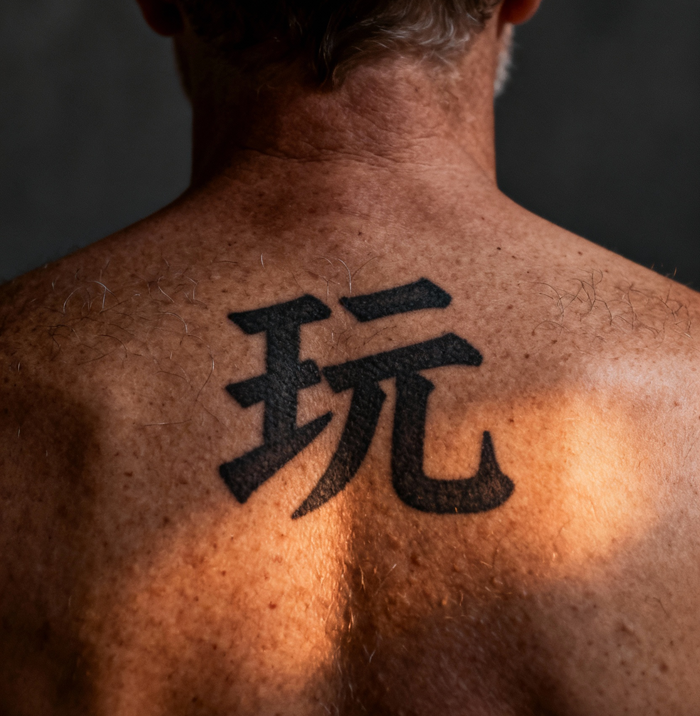
I. The Core Meaning of the Japanese Kanji "玩" (gan / moteasobu)
The kanji "玩" carries a nuanced meaning that sits between positive appreciation and negative frivolity. Its core concepts are "to play with," "to enjoy," "to appreciate," but also "to trifle with."
1. Literal & Common Meanings:
To play with; to amuse oneself:
玩ぶ (もてあそぶ, moteasobu) - To play with; to toy with; to fiddle with. This verb often carries a connotation of handling something lightly, sometimes without deep respect.
To appreciate; to enjoy (art, scenery):
玩賞 (がんしょう, ganshō) - Appreciation (e.g., of art, flowers).
An object for enjoyment:
玩具 (がんぐ, gangu / おもちゃ, omocha) - Toy.
2. Figurative & Symbolic Meanings:
The symbolism of "玩" is a delicate balance between two poles:
Aesthetic Appreciation: In its positive sense, it represents a deep, contemplative enjoyment of beauty and art. It's about savoring and finding pleasure in the finer, subtle things in life.
Frivolity and Superficiality: In its negative sense, it can symbolize treating something serious as a mere plaything—being frivolous, dismissive, or not taking things seriously enough. The word 玩弄する (がんろうする, ganrō suru) means "to toy with (someone's feelings)," indicating a manipulative and disrespectful action.
II. "玩" as a Tattoo: Meanings and Considerations
A tattoo of "玩" is a highly sophisticated and somewhat risky choice. It speaks to a philosophy of finding joy and appreciation, but its ambiguity requires careful consideration.
Potential Intended Meanings (from the wearer's perspective):
A Philosophy of Playful Appreciation: The tattoo can represent a commitment to approaching life with a sense of play, curiosity, and deep appreciation for beauty, art, and everyday pleasures. It's about "playing" with ideas and savoring experiences.
A Life of Leisure and Aesthetics: It can symbolize a rejection of overly serious ambition in favor of a life dedicated to personal enjoyment, hobbies, and the appreciation of art and nature.
A Reminder Not to Take Life Too Seriously: It can be a personal mantra to maintain a lighthearted and playful spirit, to "play" with life's challenges rather than be crushed by them.
⚠️ Important Considerations & Potential Drawbacks
The main challenge with a "玩" tattoo is its inherent duality and potential for negative interpretation.
The Duality: Appreciation vs. Frivolity: This is the central risk. While you may intend it to mean "aesthetic appreciation," it can easily be interpreted as "frivolous," "superficial," or "not serious." The character itself sits in a gray area between deep enjoyment and shallow play.
Association with "Toying With" Feelings: The negative connotation of 玩弄する (to toy with someone) is a significant drawback. The tattoo could be misread as representing a manipulative or non-committal personality.
Lack of Unambiguous Positivity: Unlike "楽" (rakuten - comfort, pleasure) or "喜" (yorokobi - joy), "玩" does not have a purely, unambiguously positive meaning. Its value is entirely dependent on the context provided by the wearer.
Subtlety and Constant Explanation: The wearer will likely need to explain their intended positive meaning, as the negative interpretation is a very real and present aspect of the character.
Conclusion and Recommendation
The kanji "玩" is a thought-provoking and nuanced choice for a tattoo, but it is generally not recommended due to its high potential for misunderstanding.
While the concept of playful appreciation is beautiful, this kanji carries too much baggage of frivolity and disrespect to be a safe choice.
If you are drawn to the concepts of "play," "enjoyment," or "appreciation," consider these much safer and clearer alternatives:
For "play" or "enjoyment," use: 遊 (asobu - to play, to have fun). This is the standard, positive character for play.
For "joy" or "delight," use: 喜 (yorokobi - joy) or 楽 (raku - pleasure, comfort).
For "appreciation" of art, use: 賞 (shō - prize, appreciation) or 芸 (gei - art).
In summary, "玩" is a high-risk tattoo choice. Its ambiguous nature means the positive message you intend is likely to be lost or misinterpreted. To express a philosophy of joy and appreciation, the character 遊 (asobu) is a far more direct, positive, and universally understood symbol.